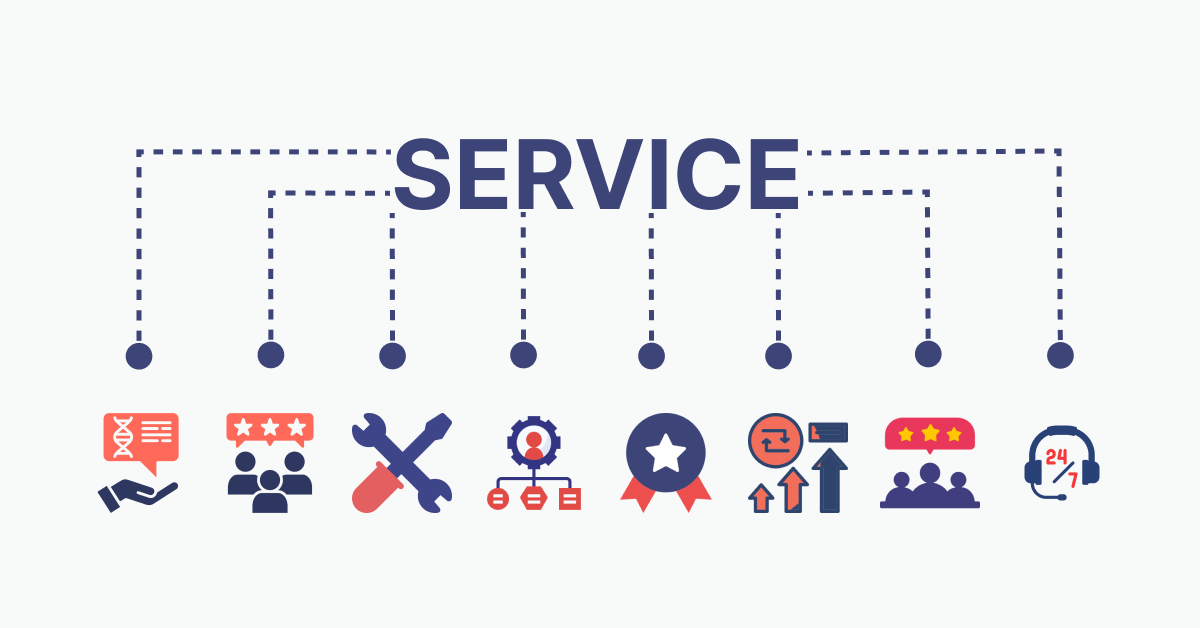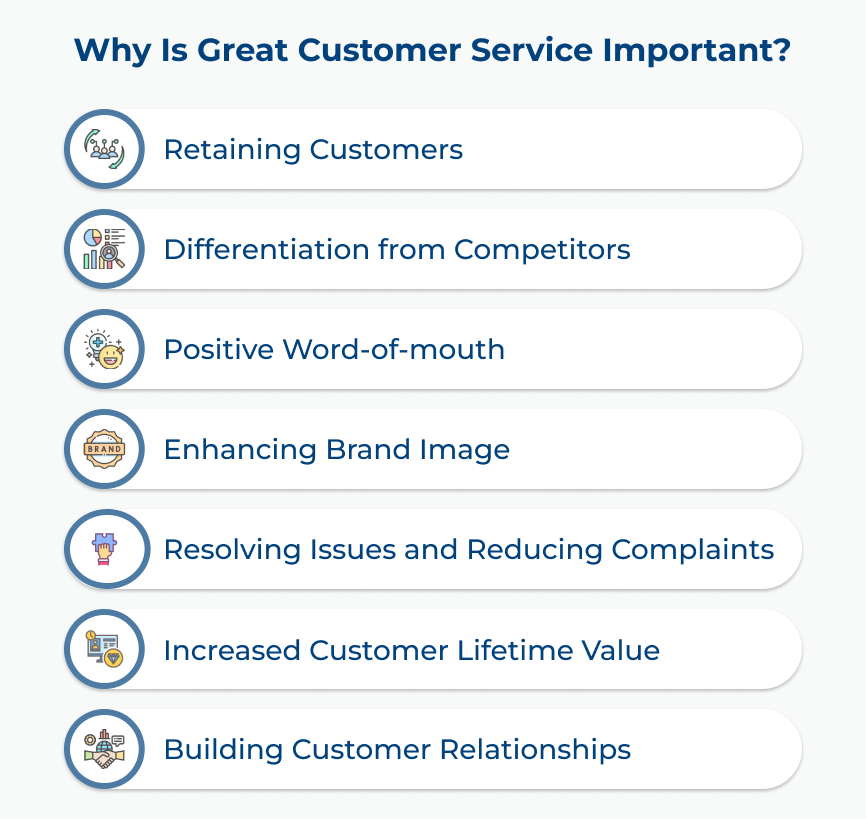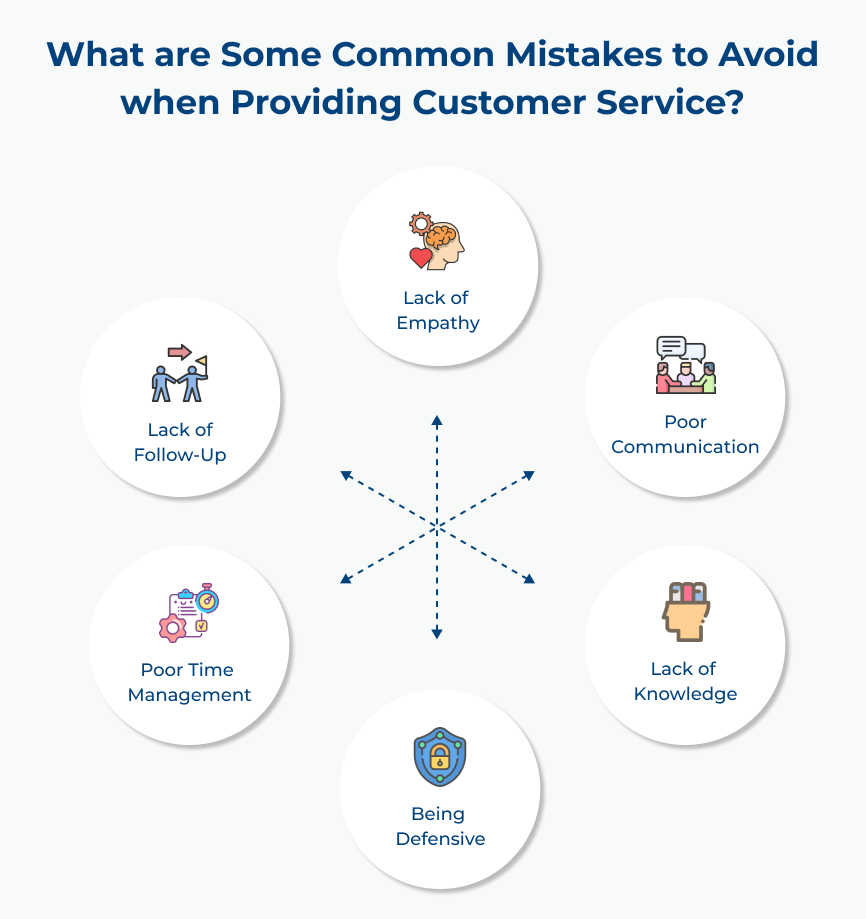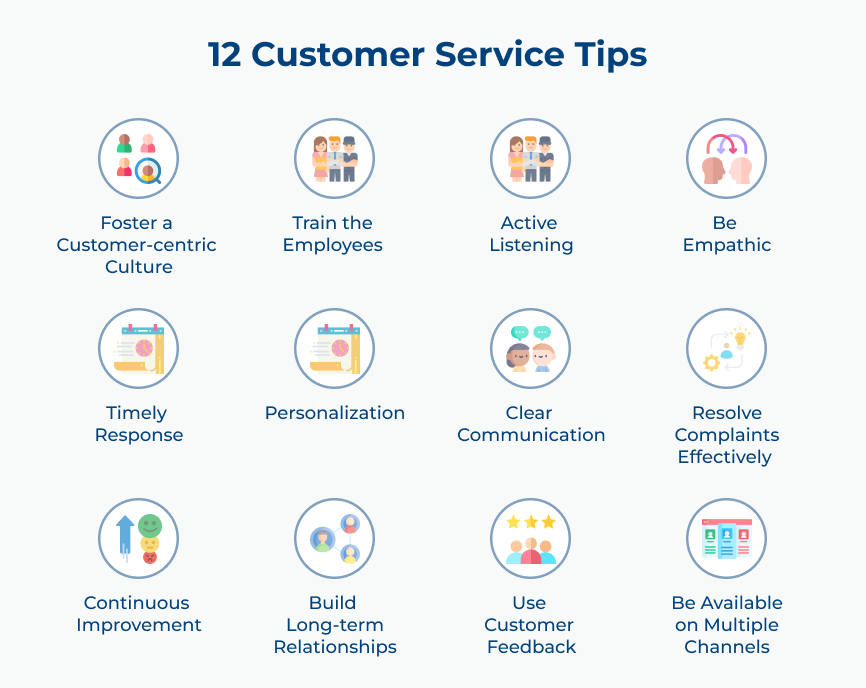1. Promote a Customer-centric Culture
Promoting a customer-centric culture is crucial because it helps in understanding your customers better and tailoring the solutions to meet their specific needs. When customers feel valued, they are likely to continue doing business with the brand and recommend it to others.
A great example of a company that facilitates a customer-centric culture is Amazon. They have revolutionized the online shopping experience by personalizing recommendations based on customer preferences and constantly improving their delivery services. Amazon actively listens to customer feedback and uses it to make strategic business decisions.
Ways to implement:
- Encourage customer service agents to actively listen to customers, address their concerns promptly, and go the extra mile to exceed their expectations.
- Collect regular feedback from customers through surveys or social media and use it to make necessary improvements.
- Empower the employees to make decisions that benefit the customer, even if it means bending some rules.
2. Train the Employees
Training your staff is crucial for improving customer service and ensuring customer satisfaction. When the employees are well-trained and equipped with the necessary skills, they are more likely to handle customer queries efficiently. The importance of training your staff lies in the fact that they are the ones who interact directly with customers and represent the brand.
Imagine a scenario where a customer has a complaint or a problem. If the customer service agents are trained to actively empathize with the customer, they can defuse the situation and find a satisfactory resolution. Untrained staff may end up making the customer even more frustrated, leading to a loss of business.
Ways to implement:
- Companies can organize regular workshops and seminars focused on customer service skills. It will help employees stay up to date with the latest techniques.
- Role-playing exercises can be used to simulate customer interactions and provide practical training.
- Providing online courses or utilizing e-learning platforms allows employees to learn at their own pace.
3. Active Listening
Active listening is a crucial skill that can greatly enhance the overall customer experience. It involves fully engaging with the customer, attentively understanding their concerns and responding effectively. Active listening is important because it promotes empathy and builds rapport with customers.
One example of active listening is when a customer calls a helpline with a complaint. Instead of rushing to find a quick solution, an active listener will patiently listen to the customer’s frustrations, validate their feelings, and take the necessary steps to address their concerns. It makes the customer feel valued and they are more likely to continue their association with the company.
Ways to implement:
- Customer service reps should first create a conducive environment by eliminating distractions and actively engaging with the customer.
- Avoid interrupting or making assumptions and always provide appropriate solutions.
- The agents should ask open-ended questions. They should summarize the customer’s concerns and provide feedback to show that they are actively listening.
4. Be Empathic
Demonstrating empathy shows customers that you care about their concerns, making them more likely to trust the brand and stay loyal. Businesses can better grasp the customer’s challenges and find effective solutions when they put themselves in the customer’s shoes. 49% of customers want agents to be empathetic.
An example of empathy in action is when a customer expresses frustration about a product issue. Instead of dismissing their concerns, an empathetic customer service representative actively listens and acknowledges their frustration. They focus on resolving the problem swiftly.
Ways to implement:
- Use phrases like “I understand how you feel” to let customers know you empathize with their emotions.
- Provide personalized solutions tailored to their specific needs to address their concerns effectively.
5. Timely Response
A timely response has become crucial for businesses to maintain excellent customer service. Customers expect a prompt and efficient response when customers reach out with inquiries, concerns, or complaints. Failing to meet their expectations can negatively impact their perception of the brand and their overall satisfaction.
An example of the significance of timely response can be seen in a scenario where a customer has a faulty product. If the company responds promptly by acknowledging the issue and providing a solution, the customer feels valued. If there is a delay or no response at all, the customer’s frustration grows, leading to a negative perception of the company.
Ways to implement:
- Businesses can set up systems to ensure all customer inquiries are promptly received and assigned to the appropriate team member.
- Automating email responses or utilizing chatbots can also help in acknowledging customer queries immediately.
- Training customer support tips teams to prioritize timely responses and providing them with the necessary resources can further improve customer service.
6. Personalization
The importance of personalization cannot be overstated. Customers no longer want to be treated as just another number or a faceless entity. 49% of consumers said they would likely become repeat buyers if offered a personalized experience by a retail brand. Personalization allows businesses to forge a deeper connection with their customers by delivering solutions that are relevant and meaningful to them.
An example of personalization is the use of targeted email marketing. Instead of sending generic mass emails, businesses can segment their customer base and send personalized emails. It not only increases the chances of customer engagement but also enhances the overall customer experience.
Ways to implement:
- Businesses can start by collecting customer data and utilizing it to customize their offerings.
- Leveraging technology such as artificial intelligence and machine learning can further enhance personalization efforts by automating the process of understanding customer preferences.
7. Clear Communication
Clear communication is a crucial aspect of providing excellent customer service. When customers reach out for assistance, they expect their concerns to be understood and addressed promptly. Setting clear communication not only ensures that customers’ needs are met effectively but also enhances their overall experience.
Think of a customer contacting a company’s customer support team regarding a product issue. The representative listens carefully, asks clarifying questions, and provides accurate information concisely. Clear communication reassures the customer that their concern is being taken seriously and that the company is committed to resolving the issue.
Ways to implement:
- Use simple and jargon-free language to avoid confusion, ensuring clarity.
- Provide clear instructions and guidelines for addressing different types of customer concerns.
- Regularly update communication protocols and scripts to reflect any changes in products or services.
8. Resolve Complaints Effectively
Resolving complaints effectively is essential because it shows that the company values its customers and their concerns. Businesses have the opportunity to turn a negative experience into a positive one by addressing complaints promptly and professionally. It results in building customer loyalty and trust.
An example of resolving complaints effectively is when a customer contacts customer service with a problem. The representative actively listens, shows empathy and takes immediate steps to resolve the issue. They provide transparent communication, keep the customer informed throughout the process, and follow up to ensure complete satisfaction.
Ways to implement:
- Provide necessary resources and authority to resolve issues promptly.
- Offer compensation or win-back strategies to regain customer trust and loyalty.
- Continuously evaluate and improve complaint resolution processes based on customer feedback.
9. Continuous Improvement
Continuous improvement involves the ongoing evaluation and refinement of customer service practices to identify areas for improvement. It establishes a culture of innovation and learning within the company. The importance of implementing continuous improvement strategies is paramount as it enables businesses to stay ahead of competitors, meet evolving customer expectations and drive customer satisfaction.
Let’s take an example of a restaurant that can implement continuous improvement by regularly seeking feedback from customers through surveys or suggestion boxes. On the basis of the feedback, the restaurant can identify areas where service can be enhanced, such as reducing wait times or improving the quality of food.
Ways to implement:
- Regularly monitoring and tracking the metrics allows businesses to identify areas that need improvement.
- Training and development programs for employees play a significant role in enhancing customer service skills.
10. Build Long-term Relationships
Building long-term relationships with customers is crucial for improving customer service. It goes beyond simply satisfying their immediate needs; it involves creating meaningful connections that keep them coming back for more. When businesses prioritize cultivating these relationships, they reap various benefits.
An example of building a long-term relationship is through personalized marketing. Businesses can tailor their marketing efforts to create personalized experiences for each customer by using customer data. It could include personalized emails, offers, or recommendations based on their preferences and past purchases.
Ways to implement:
- Companies can invest in customer relationship management (CRM) software to track customer interactions and preferences.
- Providing regular updates and personalized offers can also strengthen relationships.
- Actively seeking feedback and promptly resolving customer issues goes a long way in building loyalty.
11. Use customer feedback
Customer feedback is invaluable for businesses looking to improve their customer service. Businesses can identify areas for improvement, build stronger relationships with their customers. Eventually, it helps them enhance the overall customer experience by actively seeking and using customer feedback.
Let’s take an instance of a restaurant that may receive feedback from a customer about slow service. The restaurant can implement measures to improve its efficiency by considering this feedback. In turn, it provides a better experience for future customers.
Ways to implement:
- Businesses should actively seek feedback through surveys, comment cards, or online reviews.
- Companies must analyze and categorize the feedback received to identify recurring themes or issues.
- Brands should take action by making necessary changes, addressing customer concerns, and communicating the improvements made.
12. Be available on multiple channels
Being present on different platforms allows customers to reach out and engage with the brand conveniently, increasing customer satisfaction. Companies provide their customers with various options to contact the business, catering to their preferred method of communication by offering multiple channels such as phone, email, social media and live chat.
Let’s consider an example of a customer who might tweet about a problem they are facing with the product. Promptly responding on Twitter to provide a solution enables companies to address the issue and showcase their attentiveness to resolving customer concerns. It leaves a positive impression on both the individual and anyone who sees the interaction.
Ways to implement:
- Businesses can start by identifying the channels that their target audience is most active on.
- Businesses should invest in the necessary tools and resources to provide timely responses.
- Training customer service representatives to handle different channels is also crucial to ensure consistent and personalized customer support tips across all platforms.
Customer Service Tips For Different Industries
Let’s go through the essential customer service tips tailored specifically for different industries, helping you navigate the diverse landscape of customer needs and expectations.
1. Retail Industry Customer Service Tips
- Train the staff to be knowledgeable about products and services. Customers rely on the expertise of retail employees, so they must have a good understanding of what they are selling.
- Provide personalized assistance. Offer suggestions and recommendations based on the customer’s preferences.
- Ensure the store is well-organized and easy to navigate. Clear signage and well-stocked shelves will help customers find what they are looking for quickly.
2. Hospitality Industry Service Tips
- Make a good first impression. Ensure the guests feel welcomed and valued from the moment they enter the establishment.
- Anticipate guests’ needs and be proactive in meeting them. Offer assistance by providing information about local attractions, transportation and dining options.
- Respond promptly to guest inquiries and complaints. Addressing issues quickly shows that you value their feedback and care about their experience.
3. Healthcare Industry Service Tips
- Develop strong communication skills. Patients often have questions and concerns about their health, so it is crucial to provide clear explanations.
- Be empathetic and compassionate. Dealing with health issues can be stressful, so showing understanding and support is essential.
- Maintain patient confidentiality and privacy. Respect patient rights and ensure that their personal information is kept secure.
4. Technology Industry Service Tips
- Provide technical support options. Offer multiple channels for customers to reach out for assistance, such as phone, email and live chat.
- Simplify complex technical jargon. Explain concepts in a way that is easy for customers to understand, without overwhelming them with technical terms.
- Offer ongoing training and education. It is essential to keep customers informed about new features and updates.
5. Food and Beverage Industry Service Tips
- Provide prompt and efficient service. Minimize waiting times and ensure that customers receive their orders promptly.
- Pay attention to food quality and presentation. Consistently deliver delicious meals that meet or exceed customer expectations.
- Be responsive to dietary restrictions and food allergies. Offer alternative options for customers with specific dietary needs.
Elevate the Customer Service Game with Our Expert Tips
Elevating the customer service game is essential for the success of any business. Implementing excellent customer service tips, such as active listening, personalized interactions, and timely response, can create a positive customer experience.
Remember, happy customers are more likely to become loyal customers and spread positive word-of-mouth about the business. Investing in customer service training for the team and utilizing technology to streamline processes can also greatly enhance the service efforts. Don’t underestimate the power of exceptional customer service. Start implementing the tips today and watch the business thrive.














